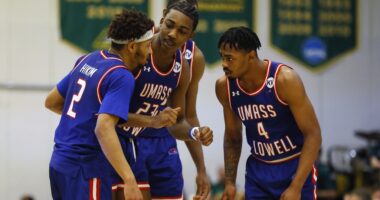Content ahead

The excitement of March Madness has lived up to expectations this month, with thrilling upsets and buzzer-beaters during the first two rounds of the NCAA Tournament. Adding to the excitement, Massachusetts residents now have the opportunity to place bets on the March Madness games for the very first time.
This implies that a substantial amount of money will be bet.
Massachusetts gamblers are projected to wager over $120 million on the men’s basketball NCAA Tournament through Play MA projects.
The immense popularity of college basketball among sports bettors, both in Massachusetts and beyond, is evident from the tremendous interest it receives. However, unlike several other states, Massachusetts has a distinct restriction that prevents its residents from betting on in-state college teams, except during tournament occasions like March Madness.
Do we really need that restriction? What is the objective behind it? Does it actually contribute to achieving that objective?
More betting opportunities equals more tax revenue
C.J. Fisher, the co-chair of Fox Rothschild’s gaming department, specializing in compliance and regulatory matters within the gaming industry, contemplates these inquiries.
In a fully developed market, tax revenue generated from sports betting in Massachusetts could reach nearly $90 million. This funding plays a crucial role in supporting state programs and initiatives promoting responsible gambling. Moreover, if the state were to permit betting on in-state college basketball and other sports during their respective seasons, this figure would experience an incremental rise. Although the increase may not be substantial, it would still contribute positively to the overall revenue.
Fisher highlights the fact that individuals who engage in betting activities have the opportunity to cross state borders in order to place bets that are prohibited within their own jurisdiction. For instance, just like Massachusetts, New Jersey has restrictions in place that prohibit placing wagers on schools within their state.
Fisher informed Play MA that if she is in Camden, New Jersey, and desires to wager on Rutgers, she can simply cross the bridge to Philadelphia and use a Pennsylvania sportsbook to place her bet.
The difficulties in regulating college sports betting are highlighted by recent purported infractions committed by sports betting operators in Massachusetts. During February, three retail sportsbooks supposedly provided odds and allowed bets for a short period on games featuring Merrimack, Boston College, and Harvard. The Massachusetts Gaming Commission has not yet made a decision regarding these occurrences.
How does Massachusetts compare to other states?
Legal sports betting is available in over 30 states, and most of them permit unrestricted wagers on collegiate sports, including local teams. A prime illustration of this is Michigan and Ohio, where sports enthusiasts can place bets on any in-state college team throughout the regular season and tournament games.
Fisher stated that Massachusetts is not the only state facing these issues. Violations have been observed in multiple states, such as New Jersey. The crucial aspect to consider is whether states will persist in implementing such prohibitions and maintaining them.
The ban on in-state college betting in New Jersey, which consumers were pressuring to lift in 2021, remained in place after the referendum to remove it failed.
Rationale for college sports betting limitations
What is the reason behind prohibiting betting on local schools such as BC or Harvard in Massachusetts? The main justification is to safeguard against point-shaving, bribery, and gambling scandals. As college athletes do not receive direct compensation for their participation in sports, there is a concern that they may be tempted to manipulate game outcomes for personal gain. This worry also extends to officials involved in the games.
Such claims have rarely occurred before. The most recent scandal related to NCAA sports and point-shaving took place almost forty years ago. In the mid-1980s, Tulane’s men’s basketball program was found guilty of a scheme to manipulate game scores. In the late 1970s, two players from the Boston College men’s basketball team colluded with mobsters to fix games.
The effectiveness of the ban is being questioned, as bettors have the option to easily cross the state border and place bets if they wish. Alternatively, they might resort to unregulated offshore sportsbooks for odds on local college basketball, football, and other events, which is even more concerning.
Regulators have expressed the intention to safeguard college students against the allure of sports gambling. Prohibiting betting on their own school team could serve as a preventive measure against problem gambling and potentially reduce instances of underage gambling.
March Madness will be open for betting regardless of whether Massachusetts upholds its prohibition on college sports betting involving local schools. Fisher asserts that its immense popularity is indisputable due to its widespread appeal.
Fisher stated that the majority of individuals, regardless of their interest in college basketball, are likely to come across office pools. This experience is often a lifelong occurrence for some people. Such exposure generates curiosity in the tournament, including the multitude of games and the overall spectacle of March Madness, which remains in the news for several weeks.






